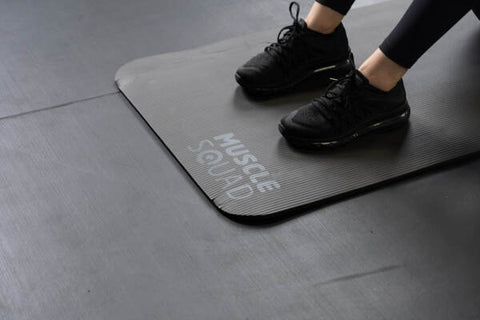When embarking on your fitness journey, you may experience a whole roller-coaster of emotions, excitement to start progressing towards your goals, anxiety around going to the gym or even stress around trying to break old habits while making new ones. At MuscleSquad we are all too familiar with all these feelings, all of us in the office here started our journeys at different places and all have our own individual pursuits, from competitive bodybuilding to powerlifting to calisthenics all the way to sports specific training like football.
The aim of this blog is to get you in the right mindset and help you avoid common pitfalls that people tend to fall into when starting their fitness journey. One to clarify is that when we say fitness journey, this can range from someone just wanting to improve their health and wellbeing to someone who wants to pursue a specific set goal like couch to 5k. Fitness is for all, and we are all on our own journeys.

Three Mistakes to Avoid when Starting your Fitness Journey
1.) Not setting Realistic Goals
When starting your journey, you need a goal, what is it that you are trying to achieve? Are you trying to reduce your bodyfat? Want to build muscle? Get stronger? Once you have the goal, you need to break it down and be specific about it. If your goal is to lose fat, how much fat do you want to lose? Is there a particular bodyfat percentage you want to get down to? Once you have set the primary goal, you need to break it down even further, what are realistic reasonable time frames for you to achieve this. If you are 30% bodyfat, it is very unrealistic to get to 20% in the space of a month, you will need multiple months of slow dieting, training, cardio etc to achieve this goal.
The mistake people make is that they say: ‘I want to lose fat’ or ‘I want to get in shape’ then they go gym and try to do whatever they can to achieve this but ultimately end up quitting because they have not achieved their goal within a few weeks. If you set realistic goals, with specific achievable time frames for how you will achieve it and even give yourself buffer time for potential slip ups and setbacks then you are putting yourself in a position where it is difficult to fail and the road to success is smooth.
Back to the previous example if you want to get down from 30% to 20% bodyfat, you will need to break it down to losing 1-2lbs per week, which can equate to 2-3% bodyfat per month drop and from there you could probably drop that 10% bodyfat in 4 months (maybe longer or depending on how much weight you are losing.) Then plan a diet, exercise regime etc to accommodate all of this.
(Tips to lose fat: https://musclesquad.com/blogs/health/tips-to-lose-fat)

2.) Doing too much too soon (Burning out)
A common pitfall that gets people is pushing themselves beyond their capacity and burning themselves out too soon. Let us say someone has set out to build muscle and desires to fill out their clothes more. They start going to the gym and are training intensely 6 days a week because they have a found a routine online to follow and want to progress as fast as possible. Going from training zero days per week to six days is a huge change, that’s 12 hours from your week. (Assuming they train for approx. an hour per session, plus an additional hour for each session commuting to the gym and back, changing/showering etc all the things around attending the gym that you may not account for.)
As you can see, that is a significant lifestyle change, for most of us, this can be very overwhelming and may lead to burnout. A better approach would be to start slow, go the gym 2 days per week or start with 3 days if you are comfortable with 3. Attend the gym 3 days per week for your first month (4 weeks). After month one, you have become accustomed to training 3 days per week, you should have your schedule in place, and have built the habit of attending the gym. Now if you have the spare capacity to train for 4 days a week, up your days from 3 to 4, then when you are ready up it to 5 then go for 6.
It is important that you can be able to sustain your output, and if you up your days at the gym from 4 to 5 for example and find you are having a hard time making all 5 sessions every week, then there is no harm in going back to 4 and maintaining 4 days per week. You can still achieve great results from training 4, 3 or even 2 days per week with the right approach.
Burnout is both physical and mental. For the mental aspect it may take up too much of your will power to train 6 days a week, but you can build this by tapering up slowly. On the physical side, your body may not be able to handle 6 lifting sessions per week, so you will need to give your body time to slowly adapt to high frequency training. By pacing yourself, you are way more likely to build habits that you can sustain for the long term which will guarantee you results. (Building muscle is a marathon, it is a slow, tedious process where you force your body to adapt to stimulus and grow new tissue due to the constant stress you are applying to it from lifting heavy.)
(Progressive overload to build muscle and strength: https://musclesquad.com/blogs/weight-lifting-strength-training/the-power-of-progressive-overload-unlocking-your-full-potential-in-fitness)

3. Comparing yourself to other people
This extends beyond fitness and applies to all aspects of life. You may be familiar with the expression: ‘Comparison is the thief of joy’ This may be an overused cliché, but it is the truth. When starting your journey, you may see someone progress much faster than you without even needing to put in as much effort. You must not let that dishearten you, it may take you longer to achieve your goal but as long as you preserve you will achieve it. We are all born with a different set of cards in life, and it is about making the most of the hand that you have been dealt. By wasting time looking at someone else’s hand, you are missing out on the opportunity to make the most of your own hand and utilising your own strengths to realise your own potential.
The mindset is slightly different if you are competing in some type of competition and friendly competition is a great motivator. It is natural to occasionally compare yourself to others, the key is to do so in a healthy and constructive manner. Instead of making comparisons that lead to negative feelings, focus on self-improvement, self-compassion, and celebrating your own progress and achievements. Remember that everyone's journey is different, and what matters most is your personal growth and well-being, not how you stack up against others.

Summary
The three key takeaways: Set realistic goals, do not overdo it too soon, pace yourself and do not compare yourself to other people. You may have noticed that these 3 tips are all about your mentality. The key to achieving your goals are within your own mind. If you are having a hard time getting in the right mindset then hiring a coach may be a good option as they can help put you on the right track. If you have any comments or personal tips you would like to share, please leave them in the comments below and for more fitness tips, sign up to our newsletter.

 Sep 22, 2023 - Think Shaw
Sep 22, 2023 - Think Shaw


Leave a comment: